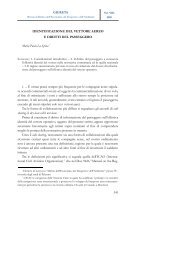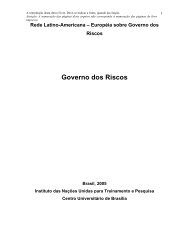The Old and the New Limits to Freedom of Contract in Europe
The Old and the New Limits to Freedom of Contract in Europe
The Old and the New Limits to Freedom of Contract in Europe
You also want an ePaper? Increase the reach of your titles
YUMPU automatically turns print PDFs into web optimized ePapers that Google loves.
ERCL 2/2006 <strong>The</strong> <strong>Old</strong> <strong>and</strong> <strong>the</strong> <strong>New</strong> <strong>Limits</strong> <strong>to</strong> <strong>Freedom</strong> <strong>of</strong> <strong>Contract</strong> <strong>in</strong> <strong>Europe</strong><br />
265<br />
problem <strong>of</strong> violation <strong>of</strong> <strong>in</strong>dividual fundamental rights. 22 It is ra<strong>the</strong>r <strong>the</strong> clash<br />
<strong>of</strong> <strong>in</strong>compatible legal spheres or rationales, more precisely, <strong>the</strong> case <strong>of</strong> corruption<br />
<strong>of</strong> <strong>the</strong> solidarity-based family sphere by <strong>the</strong> logic <strong>of</strong> contract law <strong>and</strong> <strong>the</strong><br />
underly<strong>in</strong>g dynamics <strong>of</strong> <strong>the</strong> market. 23 Any concern for fairness <strong>in</strong> contract<br />
law is banned from this perspective: it is just not an <strong>in</strong>terpretive issue here.<br />
On <strong>the</strong> contrary, <strong>the</strong> analysis concentrates on legal <strong>and</strong> social aspects different<br />
from those concern<strong>in</strong>g <strong>the</strong> contractual relation between <strong>the</strong> bank <strong>and</strong> <strong>the</strong><br />
consumer as unequal barga<strong>in</strong><strong>in</strong>g partners. <strong>The</strong> focus here shifts <strong>to</strong> <strong>the</strong> ‘impossibility’<br />
<strong>of</strong> a guaran<strong>to</strong>r, who is at <strong>the</strong> same time supposed <strong>to</strong> be bound <strong>to</strong> <strong>the</strong><br />
deb<strong>to</strong>r by ties <strong>of</strong> familial solidarity <strong>and</strong> <strong>to</strong> be led <strong>to</strong> <strong>the</strong> rational choice by <strong>the</strong><br />
typical <strong>in</strong>dividualism <strong>of</strong> a market ac<strong>to</strong>r. <strong>The</strong> evidence <strong>of</strong> such impossibility<br />
requires more rigorous boundaries <strong>to</strong> freedom <strong>of</strong> contract <strong>in</strong> order <strong>to</strong> preserve<br />
non-market-like social realms from <strong>the</strong> corruptive <strong>in</strong>fluence <strong>of</strong> <strong>the</strong><br />
market rationale. In Teubner’s view, such boundaries f<strong>in</strong>d <strong>the</strong>ir constitutional<br />
foundation <strong>in</strong> those pr<strong>in</strong>ciples <strong>of</strong> <strong>the</strong> Grundgesetz that construe social <strong>in</strong>stitutions<br />
like <strong>the</strong> family, art, 24 education, etc, upon values o<strong>the</strong>r than <strong>the</strong> rationality<br />
<strong>and</strong> <strong>the</strong> <strong>in</strong>dividualism <strong>of</strong> <strong>the</strong> market. As <strong>to</strong> our discourse on freedom<br />
<strong>of</strong> contract, this amounts <strong>to</strong> assign<strong>in</strong>g <strong>to</strong> constitutional pr<strong>in</strong>ciples or constitutional<br />
rights 25 – <strong>the</strong> role <strong>of</strong> def<strong>in</strong><strong>in</strong>g impenetrable areas <strong>of</strong> market <strong>in</strong>alienability<br />
by remov<strong>in</strong>g specific rights or entitlements from <strong>the</strong> <strong>in</strong>dividual’s ability <strong>to</strong><br />
dispose <strong>of</strong> <strong>the</strong>m freely by contract. <strong>The</strong>refore, although Teubner’s <strong>in</strong>terpretation<br />
<strong>of</strong> <strong>the</strong> bonus mores clause explicitly rejects paternalist motives, for <strong>the</strong><br />
simple reason that it does not focus on <strong>the</strong> <strong>in</strong>dividual/State relationship, it<br />
ultimately fits <strong>in</strong> <strong>the</strong> general scheme <strong>of</strong> this first model.<br />
2. <strong>The</strong> Social Model<br />
Accord<strong>in</strong>g <strong>to</strong> classical liberal thought freedom <strong>of</strong> contract is a basic condition<br />
for fulfill<strong>in</strong>g <strong>the</strong> wellbe<strong>in</strong>g <strong>of</strong> society <strong>and</strong> justice. 26 <strong>The</strong>refore limits <strong>to</strong> freedom<br />
<strong>of</strong> contract, as already seen <strong>in</strong> <strong>the</strong> paternalistic model, are <strong>the</strong>oretically<br />
conceived as exceptions, although <strong>the</strong>y are <strong>in</strong> fact valuable <strong>to</strong>ols for enact<strong>in</strong>g<br />
state policies <strong>and</strong> goals.<br />
At <strong>the</strong> beg<strong>in</strong>n<strong>in</strong>g <strong>of</strong> <strong>the</strong> 19 th century ano<strong>the</strong>r str<strong>and</strong> <strong>of</strong> socio-philosophical<br />
<strong>and</strong> legal thought produced an alternative vision, accord<strong>in</strong>g <strong>to</strong> which freedom<br />
22 Ibid, 390.<br />
23 Ibid, 392.<br />
24 See also C. Beat Graber / G. Teubner, ‘Art <strong>and</strong> Money: Constitutional Rights <strong>in</strong> <strong>the</strong><br />
Private Sphere’ (1998) 18 Oxford Journal <strong>of</strong> Legal Studies 61.<br />
25 Beat Graber / Teubner, n 24 above.<br />
26 Grimm, n 1 above, 1232.



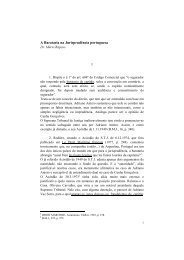


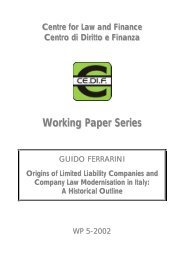
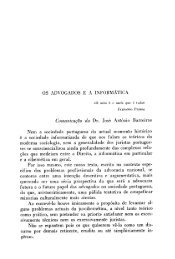
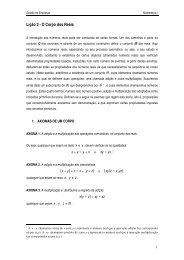

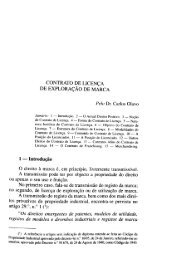
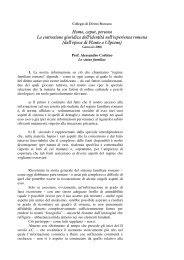
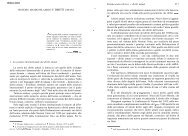

![Luigi Sapio Nozione di islām La parola “islām” [ ] è il mas.dar1 ...](https://img.yumpu.com/15836073/1/185x260/luigi-sapio-nozione-di-islam-la-parola-islam-e-il-masdar1-.jpg?quality=85)
